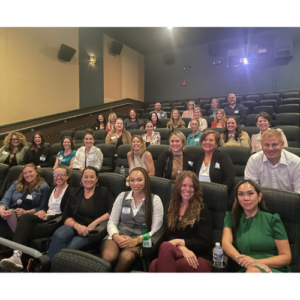How to Transition Into a Leadership Role
The Mentorship Circle: From Receiving to Giving
Remember when you first stepped into the automotive world? Perhaps you felt like Sally Lopez did in the mid-80s when she showed up for an interview at a dealership, only to find a construction site with a trailer as the temporary office.
“I was 19 years old, scared to death, and completely unsure of what to expect or say,” Sally shared during her interview with Women In Automotive. “A woman—who I later learned was the CFO of the group—walked up to me and said, ‘Sally, follow me. Let’s get you a glass of water—you look like you’re about to faint!’ She immediately made me feel at ease.”

That simple act of kindness from a female leader in a predominantly male industry changed the trajectory of Sally’s career. “Her mentorship inspired me every step of the way, and I’ll never forget how she took the time to make me feel welcome and confident when I was so unsure of myself.”
Now it’s your turn. You’ve accumulated wisdom, overcome obstacles, and developed expertise that others could benefit from. The question is no longer “How do I find a mentor?” but rather “How do I become the mentor I needed?”
Why Mentorship Matters in Automotive
The automotive industry is transforming rapidly—from electric vehicles to autonomous driving technologies. However, technological evolution must be matched by cultural evolution, and that’s where mentorship plays a crucial role.
Amanda Hoffman, Pre-Owned Acquisition Manager at Riverhead Toyota, understands the unique challenges women face. She shared in her WIA interview: “When I first started at the dealership, I was the only woman on the salesfloor. I was a single mom at the time, with two young boys. I had a sales manager tell me something that has stuck with me my entire automotive career. He said, ‘They are all waiting for you to fail, and they sure won’t help you get ahead. You need to work both smarter and harder than every guy on this floor.'”

Your guidance can help other women not just survive but thrive amid these challenges. Allyson Nogaj, Hyundai Retail Experience Coach, tells Women In Automotive: “For the majority of my career, I have been underestimated, people tend to fundamentally misinterpret my personality. The kind, compassionate, warm, friendly person that I am is regularly seen as a weakness.”
This is where your mentorship becomes invaluable—helping women navigate these challenges while staying true to themselves.
Recognizing You're Ready to Mentor

“Success comes not only from hard work but also from having mentors who believe in you and push you to be better,” says Felicia. When you find yourself naturally sharing advice with colleagues, when you’ve navigated significant career obstacles and learned valuable lessons, and when you feel passionate about helping others succeed—especially other women in automotive—these are strong indicators that you’re ready to mentor.
Remember: You don’t need to be a C-suite executive to become a mentor. Women at every level have valuable insights to share.
Building Your Mentorship Approach
1. Define Your Mentorship Style
What kind of mentor do you want to be? Jamie Farley from Performance Brokerage Services approaches mentorship with empathy: “I saw it as an opportunity to bring my personality, approach, and empathy to the table. I’m passionate about connecting with dealers on a personal level, understanding their goals, and helping them navigate some of the most significant decisions of their careers.”
Your mentorship style should reflect your authentic strengths and the unique perspective you bring to the automotive industry. As Stephanie Cooney Mann advises when she spoke with Women In Automotive: “Be bold, be brave, and jump in with both feet! Remember that you belong here just like anyone else. Take up your space, speak up and give it all you got.”
2. Cultivate Essential Mentorship Skills
3. Create a Mentorship Framework
Structure helps both you and your mentee maximize your time together. Felicia Barr recommends checking in at least once a week: “When you do have your check-ins, make sure your time is fully dedicated to the conversation. Come prepared with an agenda, including specific questions or areas where you need guidance. Writing down key topics in advance ensures the meeting stays focused and productive.”
Take time to document progress and celebrate milestones to keep both parties motivated and focused. Don’t forget to agree on confidentiality boundaries—trust is the foundation of effective mentorship.

Overcoming Common Mentorship Challenges

Even seasoned mentors encounter obstacles. You might experience imposter syndrome, questioning whether you have enough to offer. Molly Kristick, Head of TrueCar Marketing Solutions, addresses this feeling directly in her interview about aligning goals with personal values: “I’ve only recently recognized these as core values—before, they were simply a way of living differently than I had in the past. Embracing bold moves, prioritizing authenticity, and seeking work that inspires me started as survival tactics to escape dissatisfaction, but over time, I realized they were guiding principles shaping every decision I made.”
Time constraints in a demanding industry present another common challenge. Emily DeStefano advises: “I constantly ask myself, ‘Am I prioritizing the right things?’ Being laser-focused on activities that move the needle is important. Clearing out noise takes time, but once you master it, you can spend more time on the long-term, strategic things you need to accomplish your goals.”
How Mentorship Enhances Your Own Leadership
The beauty of mentorship is its reciprocal nature. As you guide others, you’ll discover deeper industry insights as mentees bring fresh perspectives to familiar problems. Your communication skills will naturally enhance, benefiting all your professional relationships.
“My mentors have always pushed me to never settle, and for that, I’m incredibly grateful,” says Felicia Barr. “Just when I feel like I’ve ‘got it,’ my boss raises the bar, pushing the needle and expecting more. In those moments, I often find myself thinking, ‘Why?’ or ‘I can’t.’ But somehow, I always see it through and prevail.”
This push-and-pull dynamic of mentorship creates growth for both parties involved.
Finding Mentorship Opportunities In Automotive
Ready to begin your mentorship journey? Consider formal programs through your company or industry associations like Women In Automotive. As Amanda Hoffman advises: “Seek support, because you are not alone in this! Know the difference between a mentor, a coach, and a sponsor and find people to fill these buckets. Some people are there for advice, some are there to help teach you, and some are there to advocate for your success and open doors to new opportunities.”
Don’t overlook the power of informal mentoring either. Crissy Burton‘s experience highlights this approach: “I believe having a mentor is essential. Someone who understands your passion and goals and wants you to succeed in this industry. I am still being mentored by the person who bought me into the car business almost 9 years ago.”
Moving Forward: Your Mentorship Action Plan
Begin by reflecting on your career journey and identifying key lessons that could benefit others. This foundational work helps clarify what you uniquely bring to a mentorship relationship. Then, take the initiative to have coffee with one potential mentee and explore mutual expectations without pressure.
As Denise Leleux suggested when she spoke to WIA: “Embrace your curiosity and don’t hesitate to ask questions—great ideas can come from unexpected places!” This curiosity-driven approach can help you develop meaningful mentorship connections that evolve naturally over time.
Build mentorship into your leadership brand and advocate for mentorship programs in your organization, expanding your impact beyond individual relationships.
The Ripple Effect: Creating Legacy Through Mentorship
The transition from mentee to mentor represents more than professional advancement—it’s how we create lasting change in the automotive industry. Every woman you mentor today becomes tomorrow’s leader and mentor, creating a powerful ripple effect that transforms the industry from within.
Your experience—with all its triumphs and challenges—is the exact blueprint someone else needs. As Allyson Nogaj powerfully states: “Sometimes I am unaware of how important my presence in this industry is to other women. It is very important that we take up space and that we make room for each other.”
When women support women, we don’t just advance individual careers – we reshape what leadership looks like in automotive. We create more including workplaces where diversity of thought drives innovation. We build an industry that better reflects and serves its customers.

As you step into your role as a mentor, remember that you’re not just helping one person navigate their career—you’re contributing to a movement that’s redefining an entire industry.
Ready to create your mentorship legacy? Explore our resources at Women In Automotive and join a community that’s here to support your journey from mentee to mentor and beyond.
This article is part of our ongoing series supporting women’s advancement in the automotive industry. Share your mentorship experiences in the comments below or connect with us on social media to continue the conversation.

